The Women's and Gender Studies Residency
The Women's and Gender Studies Residency in honor of Judith Gold Stitzel
The residency program started in 1999 as an opportunity for members of the women’s studies community to learn from and interact with visiting scholars and activists. This program was initiated through the generosity of Suzanne Temple and more recently Carrie Koeturius, who support the residency in honor of Dr. Judith Stitzel, founding director of women’s studies at WVU.Scholars in Residence
Charlotte Bunch
October 6-7, 2016
Hadley Renkin
April 7-10, 2015
Sondra Hale
February 10-15, 2013Hale is also celebrated for her diligent efforts and work as an activist in anti-war movements, labor union organizing, academic freedom campaigns and feminist movements, both at home and abroad. As an activist scholar, she values her involvement on the various campuses where she has taught, including in the classroom where she is known to introduce new and controversial ideas.
Hale has published two books, including "Gender Politics in Sudan: Islamism, Socialism and the State," which was translated into Arabic in 2011. She has published nearly 100 articles and book chapters, and delivered dozens of papers and lectures on a range of topics from gendered war, conflict and genocide, the politics of memory, social movements, international gender studies, gender and citizenship, diaspora studies, cultural studies, and academic freedom. Her regional interests are in the Middle East and Africa, focusing mainly on Sudan and Eritrea.
She gave a free public lecture on Tuesday, Feb. 12 at 7 p.m. in G20 Ming Hsieh, entitled, "Women in Conflict Zones: The Politics of Memory in Sudan and Eritrea." The lecture examined the role of memory and gender in the conflict zones of the Middle East and North Africa.
Anna Clark
February 12-15, 2012Clark is currently a history professor at the University of Minnesota. Her specialties include women’s history, the history of sexuality and Irish, British and European history. Her current project explores issues relating to engendering the state and criminal law in 19th century British Imperial history.
In 2002, Clark served as the interim director of the Center for Advanced Feminist
Studies and as the Samuel Russell Chair in the Humanities from 2005-11 at the
University of Minnesota.
A variety of Clark’s work has been published in many journals, including: “Anne Lister’s
Construction of Lesbian Identity” in the Journal of the History of Sexuality
and “Wild Workhouse Girls in 19th Century Ireland” in the Journal of Social
History. Using that experience, she worked as the editor of the Journal
of British Studies from 2005-10. She has also authored four books: "Desire: A
History of European Sexuality," "Scandal: The Sexual Politics of the British
Constitution," "The Struggle for the Breeches: Gender and the Making of
the British Working Class" and "Women’s Silence, Men’s Violence: Sexual
Assault in England 1770-1845." Since 1983, Clark has participated in many
invited lectures and seminars traveling the globe and covering a range of topics
such as, “Can History be Political?” “The Sexual Crisis of Early Nineteenth Century
Britain” and “Women and the Public Sphere.”
Clark gave a public lecture on Monday, Feb. 13 at 7 p.m. in the Mountainlair
Student Union's Blue Ballroom titled, "Desire and Dissidence in the Victorian
Parlor." The conventional Victorian parlor could be a stifling place, repressing
individuality and forcing people to conform to conventions of marriage they found
too confining. This lecture explored some alternatives to conventional
Victorian marriages and households by radicals who discussed new ways of living
and loving, such as polygamy and communes.
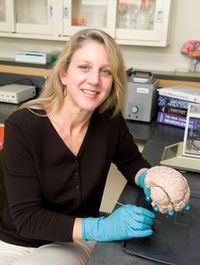 Lise Eliot, associate professor in the Department of Neuroscience at Chicago
Medical School, received a PhD in physiology and cellular biophysics
from Columbia University in 1991. From 1991 to 1994, she trained as a postdoctoral
fellow at Baylor College of Medicine, working on the mechanisms of calcium influx
in hippocampal neurons. She started working at the Chicago Medical School in
1998 where she directs the interdepartmental PhD program in neuroscience.
Lise Eliot, associate professor in the Department of Neuroscience at Chicago
Medical School, received a PhD in physiology and cellular biophysics
from Columbia University in 1991. From 1991 to 1994, she trained as a postdoctoral
fellow at Baylor College of Medicine, working on the mechanisms of calcium influx
in hippocampal neurons. She started working at the Chicago Medical School in
1998 where she directs the interdepartmental PhD program in neuroscience.
Eliot’s research bridges the social and physical sciences in her ground-breaking work on gender stereotypes and the brain. She analyzes the differences in boys and girls, arguing that infant brains develop in what begin as small differences at birth and become augmented over time, as parents and teachers, and society as a whole, reinforce gender stereotypes. By realizing how sex differences emerge, Eliot provides parents and teachers ways to help close the gaps between girls and boys.
Her publications include more that 50 works on topics in neuroscience, biophysics and biomedical research ethics. Eliot’s first book on gender differences and the brain was "What’s Going on in There? How the Brain and Mind Develop in the First Five Years of Life." Her newest book is "Pink Brain, Blue Brain: How Small Difference Grow into Troublesome Gaps and What We Can Do About It." The visit by Eliot was co-sponsored with the Eberly College of Arts and Sciences, WVU ADVANCE Center, WVU Center for Neuroscience, WVU Department of Psychology, WVU National Center of Excellence in Women’s Health and the WVU Division of Sociology and Anthropology, and included classroom visits as well as informal meetings with faculty and students. She gave a public lecture "Pink Brain, Blue Brain: Truth and Fiction about Sex Differences" on Wednesday, Feb. 16.
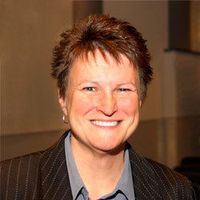 Susan Shaw, a leading activist and scholar, talked about the experiences of
women in the music industry as part of her residency. Her keynote address,
“Girls with Guitars: Women, Feminism, and Rock and Roll,” on November 13 nearly
filled Eiesland Hall's auditorium and elicited lively questions from an enthusiastic
audience who enjoyed hearing her account of women’s experiences becoming rock
musicians despite a broad range of cultural constraints. Shaw is co-author
of "Girls Rock! Fifty Years of Women Making Music," chosen by The Amelia Bloomer
Project committee for their 2005 list of recommended feminist books for young
readers.
Susan Shaw, a leading activist and scholar, talked about the experiences of
women in the music industry as part of her residency. Her keynote address,
“Girls with Guitars: Women, Feminism, and Rock and Roll,” on November 13 nearly
filled Eiesland Hall's auditorium and elicited lively questions from an enthusiastic
audience who enjoyed hearing her account of women’s experiences becoming rock
musicians despite a broad range of cultural constraints. Shaw is co-author
of "Girls Rock! Fifty Years of Women Making Music," chosen by The Amelia Bloomer
Project committee for their 2005 list of recommended feminist books for young
readers.
Director of Women Studies and of the Difference, Power and Discrimination Program at Oregon State University, Shaw has a strong record of publications in the field of women’s studies. She is most familiar to WVU students and alums as the co-author of the introductory book for women’s studies courses, Women’s Voices, Feminist Visions: Classic and Contemporary Readings. Her research interests include gender and religion, feminist pedagogies and women in popular culture. She received a PhD from the Southern Baptist Theological Seminary in Louisville, Kentucky, and her research on the role of women in the Southern Baptist church appears in her most recent book, "God Speaks to Us, Too: Southern Baptist Women on Church, Home and Society." She is also the author of "Storytelling in Religious Education" and co-author of the Teaching for Tolerance resource, "Writing for Change: Raising Awareness of Difference, Power and Discrimination." Her current project, "Women Worldwide: Feminist Perspectives on Global Women’s Issues," is being developed at the request of McGraw-Hill.
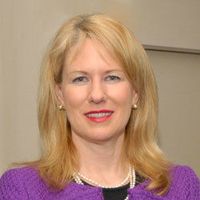 Patricia Galloway is chief executive officer and chief financial officer for
The Nielsen-Wurster Group, Inc., specialists in management consulting, risk
management and dispute resolution. Galloway was the first woman to serve
as national president of the American Society of Civil Engineers (2003-04)
and is currently a member of the National Science Board.
Patricia Galloway is chief executive officer and chief financial officer for
The Nielsen-Wurster Group, Inc., specialists in management consulting, risk
management and dispute resolution. Galloway was the first woman to serve
as national president of the American Society of Civil Engineers (2003-04)
and is currently a member of the National Science Board.
Challenges continue to face women seeking leadership positions in professions dominated by men. However, these challenges can be overcome through the three "Cs" of success: communication, confidence and commitment. She shared her insights as to how the three "Cs" of success led her to become the first woman president of a male-dominated professional organization as well as serving as president and CEO of an international corporation with students and faculty. She gave a public lecture on April 1.
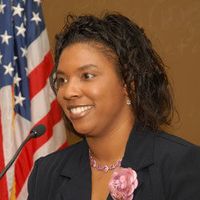 Winner of the 2005 Country Doctor of the Year Award (awarded for exemplary
primary care to a community with a population of 20,000 or fewer), Katrina
Poe is the only doctor for her home town of Kilmichael, Mississippi, which
has a population of about 800 people. The youngest recipient in the award’s
11-year history, she was selected from nearly 400 candidates. The Mississippi
Business Journal
also has honored her as one of the Mississippi 50 Leading Business Women
of the Year for 2006.
Winner of the 2005 Country Doctor of the Year Award (awarded for exemplary
primary care to a community with a population of 20,000 or fewer), Katrina
Poe is the only doctor for her home town of Kilmichael, Mississippi, which
has a population of about 800 people. The youngest recipient in the award’s
11-year history, she was selected from nearly 400 candidates. The Mississippi
Business Journal
also has honored her as one of the Mississippi 50 Leading Business Women
of the Year for 2006.
Poe returned to Kilmichael in 2001 after completing her medical training at the University of Mississippi Medical Center in Jackson. Her return came at a critical time; Kilmichael’s previous physician of more than 40 years retired one month later. Had Poe not returned, the hospital in Kilmichael would likely have closed.
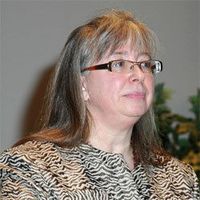 Debra Rolison is a research chemist and head of the Naval Research Laboratory’s
Advanced Electrochemical Materials section. Rolison also writes and lectures
widely on issues affecting women in science. Her public lecture was on
the topic "A Path Forward: Title IX as a Change Strategy for Science and Engineering."
Debra Rolison is a research chemist and head of the Naval Research Laboratory’s
Advanced Electrochemical Materials section. Rolison also writes and lectures
widely on issues affecting women in science. Her public lecture was on
the topic "A Path Forward: Title IX as a Change Strategy for Science and Engineering."
Rolison is a proponent of the use of Title IX as a strategy to address the disproportionately low retention of female PhD graduates as faculty members in science, technology, engineering and mathematics departments. Although more women are completing PhDs in the sciences, the fraction of women on the tenure-track faculty at top universities lags far behind. “So we’ve created this wealth of talented women in science and engineering in our country, in Canada and Europe,” Rolison noted. “And these women are frequently the best in their graduating class. They do outstanding research. And then it’s as if they’ve fallen off the face of the earth.” Rolison’s ideas with respect to using Title IX to evaluate academic science and engineering departments led to a hearing on “Title IX and Science” before the U.S. Senate Subcommittee on Science, Technology and Space in 2002. “Why propose such a drastic course of action as Title IX?” she asks. “Because it’s the law, and because it works.”
Rolison received a BS in chemistry from Florida Atlantic University in 1975 and a PhD in Chemistry from the University of North Carolina at Chapel Hill in 1980 under the direction of Royce Murray. Rolison joined the Naval Research Laboratory as a research chemist in 1980. She is also an adjunct full professor of chemistry at the University of Utah. Her research at the NRL focuses on multifunctional nanoarchitectures, with emphasis on new nanostructured materials for catalytic chemistries, energy storage and conversion, biomolecular composites, porous magnets and sensors. She is the principal inventor of composite aerogels; electrified microheterogeneous catalysis, a process to electrodesulfurize carbons and coals under mild conditions; self-organized protein superstructures; and 3-D nanowired mesoporous architectures. Rolison is a prolific writer and speaker in her field, and has been awarded 13 U.S. patents (with five pending) She lectures on the impact of ano(bio)technology on society and the ethical obligations of scientists who perform research in nanoscale science and technology.
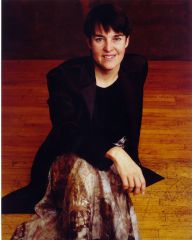 Composition is an art form fraught with practices and traditions which challenge
the composer to seek the center of her true inner voice. Libby Larsen explored
the assumptions made about musical language and how a composer speaks beyond
them in her keynote address for the women's studies residency, “The Artist’s
Search for Voice: Synthetic Structure or Organic Utterance” on Wednesday,
Oct. 13, 2004 at the WVU Creative Arts Center's Lyell B Clay
Concert Theatre. This lecture also opened the national conference on Women
and Creativity 2004: Examining the Past/Composing the Future.
Composition is an art form fraught with practices and traditions which challenge
the composer to seek the center of her true inner voice. Libby Larsen explored
the assumptions made about musical language and how a composer speaks beyond
them in her keynote address for the women's studies residency, “The Artist’s
Search for Voice: Synthetic Structure or Organic Utterance” on Wednesday,
Oct. 13, 2004 at the WVU Creative Arts Center's Lyell B Clay
Concert Theatre. This lecture also opened the national conference on Women
and Creativity 2004: Examining the Past/Composing the Future.
Larsen is both a composer and an advocate for American music. She has been vice president of the American Music Center, a director of the College Music Society, a member of the National Endowment for the Arts music panel and composer-in-residence with the Colorado Symphony. She serves on the boards of the American Symphony Orchestra League, Meet the Composer, and the Camargo Foundation. In the last 20 years, Larsen has become one of America's most prolific and most performed living composers who is constantly sought after for commissions and premieres by major artists, ensembles, and orchestras around the world. She has created a catalogue of over 200 works, spanning virtually every genre from intimate vocal and chamber music to massive orchestral and choral scores. In April 2003, the Library of Congress announced her appointment as the first holder of the Harissios Papamarkou Chair in Education and Technology in the John W. Kluge Center. As holder of the Papamarkou Chair, she worked to connect music education organizations with artists to plan new ways for arts educators and world-class artist practitioners to work together. Above all, Larsen's music and ideas have refreshed the concert music tradition and the composer's role in it.
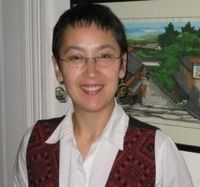 A medical anthropologist and family physician, Elizabeth Miller explored clinical
and cross-cultural perspectives on gender-based violence. She discussed her
research on HIV in Japan and the system of trafficking women into
Japan’s sex industry and ongoing research on adolescent dating violence, as
well as her experiences of teaching medical students and residents about identifying
intimate partner violence in clinical settings. She examined contrasting frameworks
on the problem of gender-based violence to illustrate the unintended consequences
and limitations of biomedical and cultural approaches.
H
er public lecture on October 15 in the Health Sciences Auditorium was titled,
"Gender Based Violence: Cultural, Political and Clinical Considerations."
A medical anthropologist and family physician, Elizabeth Miller explored clinical
and cross-cultural perspectives on gender-based violence. She discussed her
research on HIV in Japan and the system of trafficking women into
Japan’s sex industry and ongoing research on adolescent dating violence, as
well as her experiences of teaching medical students and residents about identifying
intimate partner violence in clinical settings. She examined contrasting frameworks
on the problem of gender-based violence to illustrate the unintended consequences
and limitations of biomedical and cultural approaches.
H
er public lecture on October 15 in the Health Sciences Auditorium was titled,
"Gender Based Violence: Cultural, Political and Clinical Considerations."
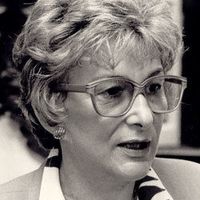 Yvette Roudy is an exemplary self-made woman whose political career began with
her activity in favor of women’s rights when she was a journalist. After being
a member of Comité Directeur of the Socialist Party, she became National Secretary
for Action Féminine in 1977 and was subsequently elected to the European Parliament
in 1979. She has held several elected posts in France since then. As minister
for women’s rights from 1981 to 1986, she fought for the adoption of laws aimed
at empowering women in French politics. She succeeded in having six crucial
laws adopted, including a law granting reimbursements for abortion-related
medical costs in 1982 and a law institutionalizing equality between the sexes
in the workplace in 1983.She has also been instrumental in adapting bioethics
legislation and has written several books on the place of women in French history
and society.
She gave a public lecture on the evening of November 13 titled, "Women's
Rights, Parity, and Perspectives on the Political Situation in France."
Yvette Roudy is an exemplary self-made woman whose political career began with
her activity in favor of women’s rights when she was a journalist. After being
a member of Comité Directeur of the Socialist Party, she became National Secretary
for Action Féminine in 1977 and was subsequently elected to the European Parliament
in 1979. She has held several elected posts in France since then. As minister
for women’s rights from 1981 to 1986, she fought for the adoption of laws aimed
at empowering women in French politics. She succeeded in having six crucial
laws adopted, including a law granting reimbursements for abortion-related
medical costs in 1982 and a law institutionalizing equality between the sexes
in the workplace in 1983.She has also been instrumental in adapting bioethics
legislation and has written several books on the place of women in French history
and society.
She gave a public lecture on the evening of November 13 titled, "Women's
Rights, Parity, and Perspectives on the Political Situation in France."
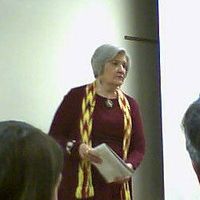 Marilou Awiakta (she prefers to be known just as Awiakta) is an Appalachian/Cherokee
writer who resides in Memphis, Tenn. She was on campus for the Eastern
Woodland Indians conference held October 12-14, 2001 prior to the residency.
Her public lecture on the evening of October 16 was titled, “Selu
in Cyberspace: Balancing the Webs.”
Marilou Awiakta (she prefers to be known just as Awiakta) is an Appalachian/Cherokee
writer who resides in Memphis, Tenn. She was on campus for the Eastern
Woodland Indians conference held October 12-14, 2001 prior to the residency.
Her public lecture on the evening of October 16 was titled, “Selu
in Cyberspace: Balancing the Webs.”
Because Awiakta grew up in Oak Ridge, Tenn., she is very interested in the blending of nuclear science with Cherokee traditions. Awiakta, a breast cancer survivor, is also very interested in ways to blend spiritual healing and high tech medical practices. Awiakta is the author of "Abiding Appalachia: Where Mountain and Atom Meet," "Rising Fawn and the Fire Mystery: A Story of Heritage, Family and Courage," and "Selu: Seeking the Corn-Mother’s Wisdom." Alice Walker has described Selu as “A book so wise and true it might have been written by Selu herself. And perhaps it was.” Gloria Steinem says that, “Marilou Awiakta is one of the rare writers whose words help readers see the world in a different way. Her weaving of essays, stories, and poems in 'Selu: Seeking the Corn-Mother’s Wisdom' creates the sense of an ancient knowledge being brought to bear on modern problems.” Her work has also appeared in Alice Walker’s "In Search of Our Mother’s Gardens" and in Steinem’s "Revolution from Within." Awiakta has been featured in three PBS programs: Natchez Trace: Pathway to Parkway, Voices of Memory: The Oral Tradition, and Telling Tales. Her work has been translated into French and published as Poesie Premiere. She received the Outstanding Contribution to Appalachian Literature Award in 1991. She has also been active in social and environmental issues, including the problem of nuclear waste disposal. Thanks to Ellesa High, chair of the Native American Studies Program, for suggesting Awiakta as a resident as a way to promote Native American studies and women’s studies together!
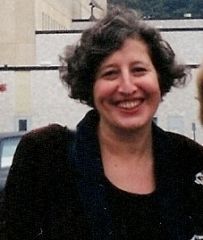 Cindy Katz received an AB (1975), MA (1979), and PhD (1986),
all in geography, from Clark University. She is the deputy executive officer
of the psychology program of the Graduate School and University Center of the
City University of New York, and she has taught in this program since 1987.
She was associate director of the Center for Human Environments of the Graduate
School and University Center of CUNY (1987-94) and co-directed the
Children’s Environments Research Group of the GSUC of CUNY (1987-93).
In 1993, she was the visiting Eliel Saarinen Professor of Urban and Regional
Planning at Helsinki University of Technology and a visiting lecturer at Khartoum
University (Sudan) in 1979.
Cindy Katz received an AB (1975), MA (1979), and PhD (1986),
all in geography, from Clark University. She is the deputy executive officer
of the psychology program of the Graduate School and University Center of the
City University of New York, and she has taught in this program since 1987.
She was associate director of the Center for Human Environments of the Graduate
School and University Center of CUNY (1987-94) and co-directed the
Children’s Environments Research Group of the GSUC of CUNY (1987-93).
In 1993, she was the visiting Eliel Saarinen Professor of Urban and Regional
Planning at Helsinki University of Technology and a visiting lecturer at Khartoum
University (Sudan) in 1979.
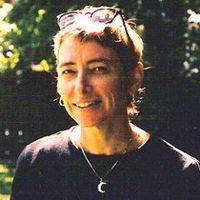 Professor Ruthann Robson, a novelist, poet and legal scholar, presented a lecture
at the National Research Center for Coal and Energy Building, on Wednesday,
Nov. 3. Her appearances were part of the WVU Center for
Women’s Studies first Women’s Studies Residency in Honor of Judith Gold Stitzel. The
week-long visit is an opportunity for students to learn more than they would
from a one-time lecturer. Robson will be visiting literature, creative
writing, foreign language and women’s studies classes across campus throughout
the week.
Professor Ruthann Robson, a novelist, poet and legal scholar, presented a lecture
at the National Research Center for Coal and Energy Building, on Wednesday,
Nov. 3. Her appearances were part of the WVU Center for
Women’s Studies first Women’s Studies Residency in Honor of Judith Gold Stitzel. The
week-long visit is an opportunity for students to learn more than they would
from a one-time lecturer. Robson will be visiting literature, creative
writing, foreign language and women’s studies classes across campus throughout
the week.
The Center for Women’s Studies was drawn to Robson because of her experience dealing with issues concerning law and gender. Robson is considered one of the nation’s foremost Supreme Court scholars and the leading authority on lesbians and the law. She is a professor at City University of New York Law School, specializing in constitutional law, feminist legal theory and law and sexuality. Robson is also the recipient of the 1990 Ferro-Grumley Foundation Award for her collection of stories, “Eye of a Hurricane.” The award is given for an outstanding work of fiction on lesbian life. Robson’s nonfiction works include “Lesbian (Out) Law,” the first book on lesbian legal theory, as well as “Gay Men, Lesbians and the Law” and “Sappho Goes to Law School.”
Lise Eliot
February 14-17, 2011Eliot’s research bridges the social and physical sciences in her ground-breaking work on gender stereotypes and the brain. She analyzes the differences in boys and girls, arguing that infant brains develop in what begin as small differences at birth and become augmented over time, as parents and teachers, and society as a whole, reinforce gender stereotypes. By realizing how sex differences emerge, Eliot provides parents and teachers ways to help close the gaps between girls and boys.
Her publications include more that 50 works on topics in neuroscience, biophysics and biomedical research ethics. Eliot’s first book on gender differences and the brain was "What’s Going on in There? How the Brain and Mind Develop in the First Five Years of Life." Her newest book is "Pink Brain, Blue Brain: How Small Difference Grow into Troublesome Gaps and What We Can Do About It." The visit by Eliot was co-sponsored with the Eberly College of Arts and Sciences, WVU ADVANCE Center, WVU Center for Neuroscience, WVU Department of Psychology, WVU National Center of Excellence in Women’s Health and the WVU Division of Sociology and Anthropology, and included classroom visits as well as informal meetings with faculty and students. She gave a public lecture "Pink Brain, Blue Brain: Truth and Fiction about Sex Differences" on Wednesday, Feb. 16.
Susan Shaw
November 11-13, 2008Director of Women Studies and of the Difference, Power and Discrimination Program at Oregon State University, Shaw has a strong record of publications in the field of women’s studies. She is most familiar to WVU students and alums as the co-author of the introductory book for women’s studies courses, Women’s Voices, Feminist Visions: Classic and Contemporary Readings. Her research interests include gender and religion, feminist pedagogies and women in popular culture. She received a PhD from the Southern Baptist Theological Seminary in Louisville, Kentucky, and her research on the role of women in the Southern Baptist church appears in her most recent book, "God Speaks to Us, Too: Southern Baptist Women on Church, Home and Society." She is also the author of "Storytelling in Religious Education" and co-author of the Teaching for Tolerance resource, "Writing for Change: Raising Awareness of Difference, Power and Discrimination." Her current project, "Women Worldwide: Feminist Perspectives on Global Women’s Issues," is being developed at the request of McGraw-Hill.
Patricia Galloway
April 1-4, 2008Challenges continue to face women seeking leadership positions in professions dominated by men. However, these challenges can be overcome through the three "Cs" of success: communication, confidence and commitment. She shared her insights as to how the three "Cs" of success led her to become the first woman president of a male-dominated professional organization as well as serving as president and CEO of an international corporation with students and faculty. She gave a public lecture on April 1.
Katrina Poe
November 6-7, 2006Poe returned to Kilmichael in 2001 after completing her medical training at the University of Mississippi Medical Center in Jackson. Her return came at a critical time; Kilmichael’s previous physician of more than 40 years retired one month later. Had Poe not returned, the hospital in Kilmichael would likely have closed.
Poe opened a clinic, where she sees 250 to 300 patients per week. In addition
to her primary care work, Poe directs the local nursing home, gives youth
psychiatric care, and is the doctor for the high school athletic team.
After meeting with students and faculty from healthcare, the sciences and other fields on Monday, Nov. 6, Poe presented a public lecture, "Issues in Rural Health," on Tuesday, Nov. 7 at 7 p.m. in the Hostler Auditorium of the Robert C. Byrd Health Sciences Center.
After meeting with students and faculty from healthcare, the sciences and other fields on Monday, Nov. 6, Poe presented a public lecture, "Issues in Rural Health," on Tuesday, Nov. 7 at 7 p.m. in the Hostler Auditorium of the Robert C. Byrd Health Sciences Center.
Debra Rolison
January 23-24, 2006Rolison is a proponent of the use of Title IX as a strategy to address the disproportionately low retention of female PhD graduates as faculty members in science, technology, engineering and mathematics departments. Although more women are completing PhDs in the sciences, the fraction of women on the tenure-track faculty at top universities lags far behind. “So we’ve created this wealth of talented women in science and engineering in our country, in Canada and Europe,” Rolison noted. “And these women are frequently the best in their graduating class. They do outstanding research. And then it’s as if they’ve fallen off the face of the earth.” Rolison’s ideas with respect to using Title IX to evaluate academic science and engineering departments led to a hearing on “Title IX and Science” before the U.S. Senate Subcommittee on Science, Technology and Space in 2002. “Why propose such a drastic course of action as Title IX?” she asks. “Because it’s the law, and because it works.”
Rolison received a BS in chemistry from Florida Atlantic University in 1975 and a PhD in Chemistry from the University of North Carolina at Chapel Hill in 1980 under the direction of Royce Murray. Rolison joined the Naval Research Laboratory as a research chemist in 1980. She is also an adjunct full professor of chemistry at the University of Utah. Her research at the NRL focuses on multifunctional nanoarchitectures, with emphasis on new nanostructured materials for catalytic chemistries, energy storage and conversion, biomolecular composites, porous magnets and sensors. She is the principal inventor of composite aerogels; electrified microheterogeneous catalysis, a process to electrodesulfurize carbons and coals under mild conditions; self-organized protein superstructures; and 3-D nanowired mesoporous architectures. Rolison is a prolific writer and speaker in her field, and has been awarded 13 U.S. patents (with five pending) She lectures on the impact of ano(bio)technology on society and the ethical obligations of scientists who perform research in nanoscale science and technology.
Libby Larsen
October 11-14, 2004Larsen is both a composer and an advocate for American music. She has been vice president of the American Music Center, a director of the College Music Society, a member of the National Endowment for the Arts music panel and composer-in-residence with the Colorado Symphony. She serves on the boards of the American Symphony Orchestra League, Meet the Composer, and the Camargo Foundation. In the last 20 years, Larsen has become one of America's most prolific and most performed living composers who is constantly sought after for commissions and premieres by major artists, ensembles, and orchestras around the world. She has created a catalogue of over 200 works, spanning virtually every genre from intimate vocal and chamber music to massive orchestral and choral scores. In April 2003, the Library of Congress announced her appointment as the first holder of the Harissios Papamarkou Chair in Education and Technology in the John W. Kluge Center. As holder of the Papamarkou Chair, she worked to connect music education organizations with artists to plan new ways for arts educators and world-class artist practitioners to work together. Above all, Larsen's music and ideas have refreshed the concert music tradition and the composer's role in it.
Elizabeth Miller
October 13-15,2003Yvette Roudy
November 11-15, 2002Marilou Awiakta
October 15-17, 2001Because Awiakta grew up in Oak Ridge, Tenn., she is very interested in the blending of nuclear science with Cherokee traditions. Awiakta, a breast cancer survivor, is also very interested in ways to blend spiritual healing and high tech medical practices. Awiakta is the author of "Abiding Appalachia: Where Mountain and Atom Meet," "Rising Fawn and the Fire Mystery: A Story of Heritage, Family and Courage," and "Selu: Seeking the Corn-Mother’s Wisdom." Alice Walker has described Selu as “A book so wise and true it might have been written by Selu herself. And perhaps it was.” Gloria Steinem says that, “Marilou Awiakta is one of the rare writers whose words help readers see the world in a different way. Her weaving of essays, stories, and poems in 'Selu: Seeking the Corn-Mother’s Wisdom' creates the sense of an ancient knowledge being brought to bear on modern problems.” Her work has also appeared in Alice Walker’s "In Search of Our Mother’s Gardens" and in Steinem’s "Revolution from Within." Awiakta has been featured in three PBS programs: Natchez Trace: Pathway to Parkway, Voices of Memory: The Oral Tradition, and Telling Tales. Her work has been translated into French and published as Poesie Premiere. She received the Outstanding Contribution to Appalachian Literature Award in 1991. She has also been active in social and environmental issues, including the problem of nuclear waste disposal. Thanks to Ellesa High, chair of the Native American Studies Program, for suggesting Awiakta as a resident as a way to promote Native American studies and women’s studies together!
Cindi Katz
October 17-21, 2000Her books include: "Full Circles: Geographies of Women Over the Life Course" (London and New York: Routledge, 1993, co-edited by Janice Monk); "Disintegrating Developments: Global Economic Restructuring and the Struggle over Social Reproduction" and "Fieldwork." She gave a public lecture on October 19 entitled, "Topographies of Global Change: Reworking the Contours of Everyday Life."
Ruthann Robson
November 1-5, 1999The Center for Women’s Studies was drawn to Robson because of her experience dealing with issues concerning law and gender. Robson is considered one of the nation’s foremost Supreme Court scholars and the leading authority on lesbians and the law. She is a professor at City University of New York Law School, specializing in constitutional law, feminist legal theory and law and sexuality. Robson is also the recipient of the 1990 Ferro-Grumley Foundation Award for her collection of stories, “Eye of a Hurricane.” The award is given for an outstanding work of fiction on lesbian life. Robson’s nonfiction works include “Lesbian (Out) Law,” the first book on lesbian legal theory, as well as “Gay Men, Lesbians and the Law” and “Sappho Goes to Law School.”